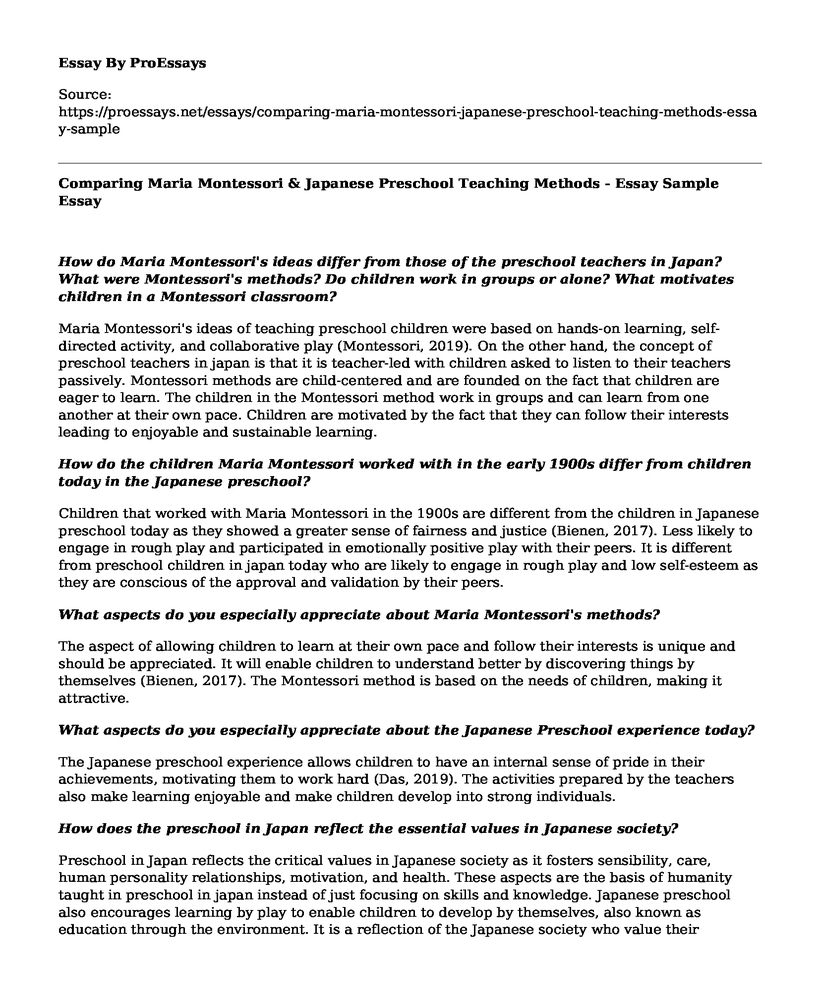How do Maria Montessori's ideas differ from those of the preschool teachers in Japan? What were Montessori's methods? Do children work in groups or alone? What motivates children in a Montessori classroom?
Maria Montessori's ideas of teaching preschool children were based on hands-on learning, self-directed activity, and collaborative play (Montessori, 2019). On the other hand, the concept of preschool teachers in japan is that it is teacher-led with children asked to listen to their teachers passively. Montessori methods are child-centered and are founded on the fact that children are eager to learn. The children in the Montessori method work in groups and can learn from one another at their own pace. Children are motivated by the fact that they can follow their interests leading to enjoyable and sustainable learning.
How do the children Maria Montessori worked with in the early 1900s differ from children today in the Japanese preschool?
Children that worked with Maria Montessori in the 1900s are different from the children in Japanese preschool today as they showed a greater sense of fairness and justice (Bienen, 2017). Less likely to engage in rough play and participated in emotionally positive play with their peers. It is different from preschool children in japan today who are likely to engage in rough play and low self-esteem as they are conscious of the approval and validation by their peers.
What aspects do you especially appreciate about Maria Montessori's methods?
The aspect of allowing children to learn at their own pace and follow their interests is unique and should be appreciated. It will enable children to understand better by discovering things by themselves (Bienen, 2017). The Montessori method is based on the needs of children, making it attractive.
What aspects do you especially appreciate about the Japanese Preschool experience today?
The Japanese preschool experience allows children to have an internal sense of pride in their achievements, motivating them to work hard (Das, 2019). The activities prepared by the teachers also make learning enjoyable and make children develop into strong individuals.
How does the preschool in Japan reflect the essential values in Japanese society?
Preschool in Japan reflects the critical values in Japanese society as it fosters sensibility, care, human personality relationships, motivation, and health. These aspects are the basis of humanity taught in preschool in japan instead of just focusing on skills and knowledge. Japanese preschool also encourages learning by play to enable children to develop by themselves, also known as education through the environment. It is a reflection of the Japanese society who value their environment and emphasize making good use of the surrounding.
Let's think about preschool and kindergarten here in the United States. If you are familiar with those programs, please offer your ideas about the differences between the three groups. (If you are not familiar with these programs, you do not need to discuss this comparison.)
Preschool and kindergarten in the United States are divided into three groups, which include kindergarten, playschool, and nursery school. In playschool, there is a close relationship between the parents and the home, and it introduces children to the social environment. Kindergarten introduces children to numeric and alphabetic, given children an advantage when they join grade one. Nursery school helps to integrate children to the local community and prepare them for elementary school.
Please discuss the ideas that you especially liked, the ideas that surprised you, and your overall impressions of Montessori's work and the operation of the Japanese preschool.
The idea that I liked about Montessori is that it is children centered on developing the social and emotional aspects of the child. The concept that surprised me is that of allowing children to learn at their own pace and discover things by themselves. On the Japanese preschool operation, I was surprised by the idea that it focuses on humanity aspects such as humanity and not just skills and knowledge.
What new and interesting ideas do you have about parenting your children?
The idea I have learned about parenting my children is that it is essential to ensure that children learn crucial life skills such as being fair and just and emphasizing on developing their self-esteem. It will make them have sustainable values for a lifetime.
References
Bienen, H. (Ed.). (2017). The Montessori Method. Routledge.
Das, A. K. (2019). Pre-Primary Education In Japan: Present Scenario. International Journal of Social Sciences, 8(1), 1-5.
Montessori, M. (2019). The Montessori Method: Scientific Pedagogy as Applied to Child Education in the Children's Houses' with Additions and Revisions by the Author. Good Press.
Cite this page
Comparing Maria Montessori & Japanese Preschool Teaching Methods - Essay Sample. (2023, May 15). Retrieved from https://proessays.net/essays/comparing-maria-montessori-japanese-preschool-teaching-methods-essay-sample
If you are the original author of this essay and no longer wish to have it published on the ProEssays website, please click below to request its removal:
- Workers in the Cane Essay
- What Can Be Done to Improve the College Graduation Rate? Essay
- Degree in German Language Completion Scholarship Application Essay
- Are College Students Too Distracted by Technology? Essay
- Women and Men in Canadian Society: Socialization in Childhood and My life Story - Research Paper
- Essay Sample on Intentional Teaching: Maximizing Children's Learning Outcomes
- Jonathan Lee, Experienced DNP, APRN & Medical Director of Primary Care Practice - Report Example







